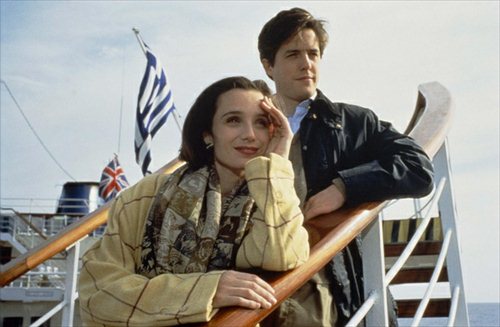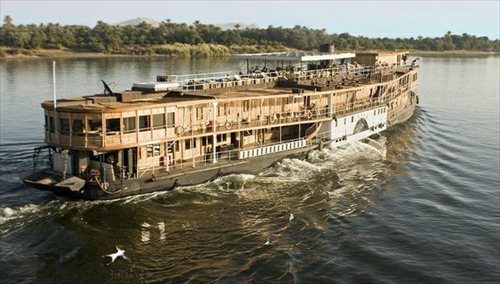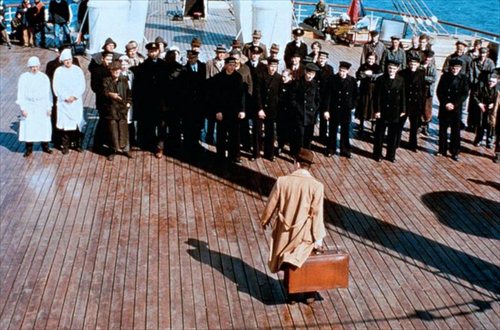Worth the voyage
Three feature-length trips set on ships
On April 15, 1912, the British passenger ship Titanic sank. Today, ask 100 people if they have seen a film set on a ship, probably 99 would have James Cameron's blockbuster on their minds.
Disaster has never been the essential ingredient of great seafaring films, though. Sailing conditions can be very fine, but drama and horror can take place all the same -on the deck, in the cabins.
Here are three gripping films that don't involve an iceberg.
Bitter Moon (Roman Polanski, 1992)

A scene from Bitter Moon
This erotic romantic thriller begins as British upper-class couple Nigel (Hugh Grant) and Fiona (Kristin Scott Thomas) sail to Istanbul en route to India in hopes of finding a cure for their seven-year marriage that has gone dry.
Nigel is soon attracted to a beautiful French woman onboard, Mimi (Emmanuelle Seigner), but both she and her wheelchair-bound husband, an alcoholic American writer named Oscar (Peter Coyote), insist that Nigel listen to the couple's back story first.
Oscar's chronological storytelling, broken into several sessions, takes place in Oscar's dim, unorganized private cabin. They take the listener and the audience to Paris, where the couple had a whirlwind love that soon went hysterical.
When it is not about Paris, the director fully exploits the site of the ship, mostly through Hugh Grant's cowardly and hypocritical gentleman.
There he is, wavering, lost, in the narrow corridor between cabins, as though his whole being is contracted by the space; holding to the deck railing all alone, quietly practicing what to say to his wife or screaming to the sea amid a storm.
My favorite scene has to be the New Year's Ball near the end, when the four protagonists join other travelers in the largest communal area, the restaurant, decorated festively.
It is unexpected, excellently timed, and the actors and actresses are at their very best. The best moment comes when Mimi walks toward her husband, who she claims to hate more than anyone on the world, and says tearfully, "happy days."
Many remember the film for its explicit and unconventional sex scenes, but it is the idea of mutually destructive and utmost cruel and greedy love that really shakes ground.
Death on the Nile (John Guillermin, 1978)

A scene from Death on the Nile Photos: douban.com
Agatha Christie readers have fondly embraced Belgian detective Hercule Poirot on his global travels on the big screen, including the time when he is found cruising down the Nile River on a luxurious paddle steamer called the SS Karnak.
The film, adapted by Anthony Shaffer, quickly unfolds the murder: Linnet Ridgeway (Lois Chiles), a wealthy heiress, is found shot dead in the head in her cabin.
The prime suspect seems to be Ridgeway's once best friend, Jacqueline de Bellefort (Mia Farrow), who clearly displays hard feelings for the victim, as her ex-boyfriend, Simon Doyle (Simon MacCorkindale), left her for the heiress.
The water gets muddier as Poirot (Peter Ustinov) discovers that everyone on the ship has a reason to kill Ridgeway, and two more deaths take place onboard.
I believe it is not difficult for anyone moderately familiar with the pattern of detective stories to figure out the truth before Poirot summons everyone into the salon and reveals his solution, but it is nevertheless a film that invites viewing and reviewing, mostly because of the talented-as-ever Mia Farrow.
Visually, the film is a delight. Under sun-soaked weather, women move about the ship in beautiful, large hemmed hats, sun dresses and jewelry, while the men look no less sophisticated in cream-toned suits.
An interesting quote comes from the nurse Miss Bowers, played by the famous Maggie Smith, who gives de Bellefort morphine during the night of the first murder.
"Alcohol and morphine would sink the Titanic," she said.
The Legend of 1900 (Giuseppe Tornatore, 1998)

A scene from The Legend of 1900
Tornatore calls it a fable, not a film. Undoubtedly a classic loved by many, the Italian director's first English-language film takes place entirely on a ship at sea, in a tale that spans over 40 years.
It was 1900, on a luxurious cruise called the Virginian, when a baby was found abandoned. Raised up by the sailors under the name of 1900 (Tim Roth), he becomes a genius pianist and wows everyone including the jazz legend Jelly Roll Morton (Clarence Williams III).
Be it mounting fame, a love interest (Melanie Thierry), or eager persuasion from a close friend on the orchestra to experience the bigger world out there, the musician eventually remains willingly confined to his trans-Atlantic steamer and as a fixture at sea.
"Land? Land is a ship too big for me, it's a woman too beautiful, it's a voyage too long, perfume too strong … It's music I don't know how to make. I can never get off this ship," 1900 says at one point.
On top of an excellent script and solid cast, the film has a stunning soundtrack that makes everything about a completely fictional pianist master so convincing.
Legendary composer Ennio Morricone contributed beautiful scores that won the Golden Globe in 2000.